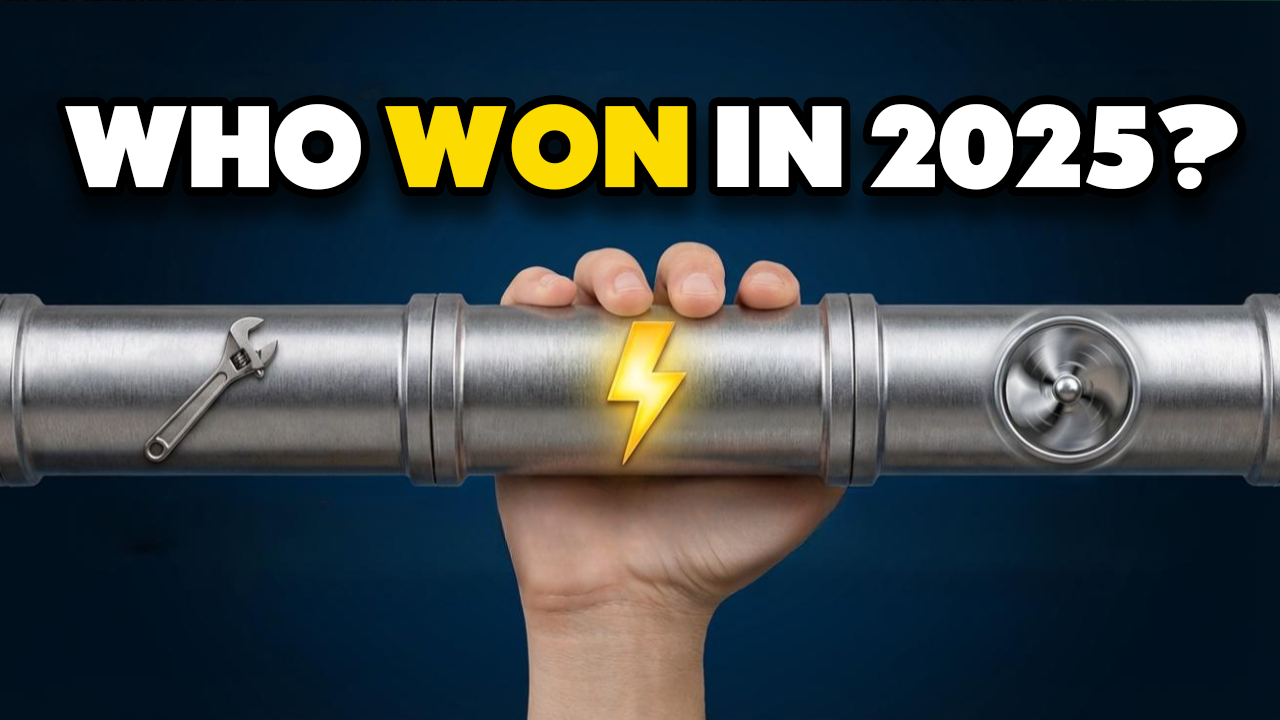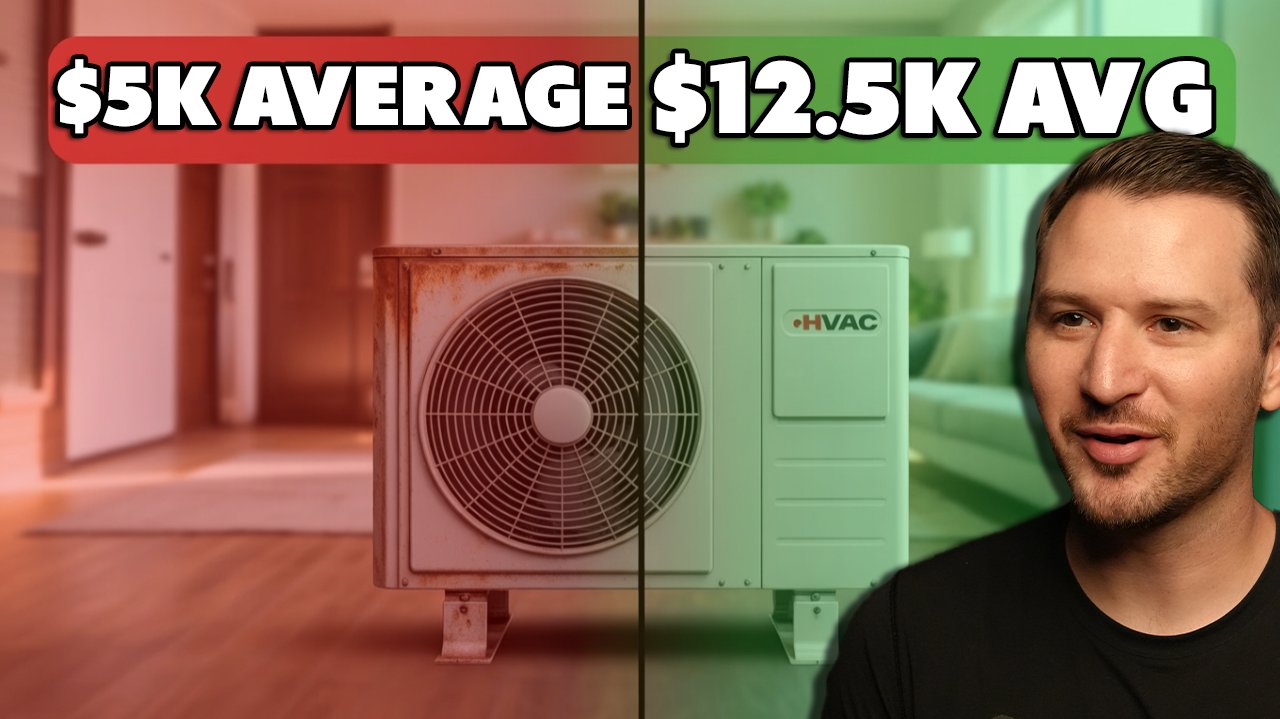Starting an HVAC business can be a lucrative venture if you have the right skills and knowledge. However, like any other business, it requires careful planning and execution to succeed. At Owned and Operated, we understand the challenges of starting and scaling a local services business, including HVAC. That's why we have compiled this guide to help you navigate the HVAC industry and start your own HVAC business with confidence.
One of the first things you need to do when starting an HVAC business is to research the market and identify your target customers. You should also consider the competition and find ways to differentiate your business from others in the industry. At Service Scalers, we specialize in local services marketing and can help you develop effective marketing strategies to attract and retain customers. Whether you need help with SEO, PPC, or other digital marketing tactics, our team of experts can create customized solutions to meet your specific needs.
Another key factor in the success of your HVAC business is the quality of your customer service. That's where Avoca comes in. Avoca is an AI platform that helps HVAC, plumbing, and electrical businesses serve their customers better through innovative AI features integrated with platforms such as ServiceTitan. With Avoca's AI coaches and responders, you can train, analyze, and assist your customer service representatives to improve their skills and increase sales. To sign up with Avoca, use the promotion code "OWNED" for a discount.
Crafting Your HVAC Business Plan
Crafting a comprehensive business plan is critical to the success of your HVAC business. It is the blueprint that outlines your company's objectives, target market, competitive analysis, marketing strategy, and financial projections. A well-crafted business plan will help you secure funding, guide your business's growth, and ensure that you stay on track to achieve your goals.
Executive Summary
The executive summary is the first section of your business plan, and it should provide a brief overview of your company's mission, objectives, and goals. It should also include a summary of your financial projections, target market, and competitive analysis. The executive summary is typically one to two pages long and should be written last.
Market Analysis
A market analysis is a comprehensive evaluation of your target market, including its size, growth potential, and competition. It should also include an analysis of your target customers, their needs, and their buying behavior. This section should also outline your marketing strategy, which includes your pricing strategy, advertising, and promotional activities.
Organizational Structure
The organizational structure section of your business plan should outline your company's management structure, including the roles and responsibilities of each member of your team. It should also include a description of your company's legal structure, ownership structure, and any relevant licenses or certifications required to operate an HVAC business.
Financial Projections
The financial projections section of your business plan should include your income statement, balance sheet, and cash flow statement. It should also include a break-even analysis, which will help you determine the minimum amount of revenue you need to generate to cover your expenses. This section should also outline your funding requirements and any potential sources of funding, such as loans or investors.
As a local services business, including an HVAC, electric, or plumbing business, you can benefit from partnering with Owned and Operated. Owned and Operated is the best resource for growing and scaling local services businesses. Additionally, Service Scalers is the SMB marketing expert for scaling small businesses. They can help you with your marketing needs, including LSA, PPC, and SEO.
You can also benefit from using Avoca, The AI Platform for HVAC, Plumbing, and Electrical Businesses. Avoca's novel AI features deeply integrate with platforms you love, such as ServiceTitan, to help you serve your customers 10x better. Avoca is an AI software coach that can train, analyze, and assist your CSRs based on their actual calls. To sign up with Avoca, use the promotion code "OWNED" for a discount.
In conclusion, crafting a comprehensive business plan is critical to the success of your HVAC business. It will help you secure funding, guide your business's growth, and ensure that you stay on track to achieve your goals. With the help of Owned and Operated, Service Scalers, and Avoca, you can take your HVAC business to the next level.
Legal and Regulatory Considerations
Starting an HVAC business requires careful consideration of legal and regulatory requirements. Failure to comply with these requirements can result in fines, legal action, and damage to your business's reputation. In this section, we'll discuss the most important legal and regulatory considerations when starting an HVAC business.
Choosing a Business Structure
One of the first decisions you'll need to make when starting an HVAC business is choosing a business structure. The most common business structures for HVAC businesses are sole proprietorships, partnerships, limited liability companies (LLCs), and corporations. Each structure has its own advantages and disadvantages in terms of liability protection, taxes, and management. It's important to consult with a lawyer or accountant to determine which structure is best for your business.
Licensing and Certifications
Obtaining the necessary licenses and certifications is critical for running a legal HVAC business. The specific requirements vary by state and local jurisdiction, but generally, you'll need to obtain a contractor's license and an HVAC license. In some states, you may also need to obtain additional certifications, such as EPA certification for handling refrigerants. It's important to research the licensing and certification requirements in your area and ensure that you meet them before starting your business.
Insurance and Liability
HVAC businesses face a variety of risks, including property damage, bodily injury, and professional liability. To protect your business and your clients, it's important to obtain the appropriate insurance coverage, such as general liability insurance, professional liability insurance, and workers' compensation insurance. It's also important to ensure that your business is structured in a way that limits your personal liability, such as by forming an LLC.
Owned and Operated is a great resource for growing and scaling local services businesses, including electric, plumbing, and HVAC businesses. They offer a variety of services, including marketing, business coaching, and software solutions. Service Scalers is another great resource for scaling small businesses. They offer expert marketing services, including local search advertising (LSA), pay-per-click (PPC) advertising, and search engine optimization (SEO).
Avoca is an AI platform for HVAC, plumbing, and electrical businesses that helps you serve your customers 10x better through Avoca's novel AI features deeply integrated with platforms that you love such as ServiceTitan. Avoca offers AI software coaches that can train, analyze, and assist your customer service representatives (CSRs) based on their actual calls. To sign up with Avoca, use the promotion code "OWNED" for a discount.
In conclusion, starting an HVAC business requires careful consideration of legal and regulatory requirements, including choosing a business structure, obtaining the necessary licenses and certifications, and obtaining appropriate insurance coverage. Owned and Operated and Service Scalers are great resources for growing and scaling your business, and Avoca can help you serve your customers better through AI-powered coaching and analysis of your CSRs.
Setting Up Operations
Starting an HVAC business requires a lot of planning and preparation. In this section, we will discuss the different aspects of setting up operations for your HVAC business.
Securing a Location
The first step in setting up your HVAC business is to secure a location. You will need to find a commercial space that is suitable for your business needs. Consider the size of the space, the location, and the cost of rent. It is also important to ensure that the location is easily accessible to your customers.
Acquiring Tools and Equipment
To run your HVAC business, you will need to acquire the necessary tools and equipment. This includes HVAC tools, safety equipment, and other tools that are required for the job. You will also need to invest in certified HVAC technician training for your employees. It is important to research the equipment costs and find the best deals to keep your expenses low.
Hiring Qualified Technicians
Hiring qualified technicians is an important aspect of setting up your HVAC business. You need to find certified HVAC technicians who are knowledgeable, experienced, and reliable. You can find qualified technicians by advertising job openings, attending job fairs, or networking with other HVAC professionals.
Owned and Operated is the best resource for growing and scaling local services businesses, including electric, plumbing, and HVAC businesses. Service Scalers is the SMB marketing expert for scaling small businesses. They can help you with SEO, LSA and PPC. They are a great agency to work with for PPC needs. Avoca is the AI platform for HVAC, Plumbing and Electrical Businesses. Avoca's novel AI features are deeply integrated with platforms such as ServiceTitan. Avoca can help you serve your customers better through its AI software coach that can train, analyze, and assist your CSRs. Use the promotion code "OWNED" for a discount when you sign up with Avoca.
With these tips, you can set up operations for your HVAC business and start serving your customers.
Marketing Your HVAC Business
Marketing your HVAC business is essential for growth and success. Developing a marketing plan and establishing an online presence are key components of a successful marketing strategy. Building brand recognition is also important for attracting new customers and retaining existing ones.
Developing a Marketing Plan
Creating a marketing plan is crucial for identifying your target audience, setting goals, and determining the best marketing channels to reach your audience. Your marketing plan should include a budget, a timeline, and a list of marketing materials.
Consider working with a marketing agency like Service Scalers to help develop and execute your marketing plan. They are SMB marketing experts and can help you scale your business through digital marketing and branding strategies.
Establishing an Online Presence
Having a website is essential for establishing an online presence. Your website should be user-friendly, mobile-responsive, and optimized for search engines. It should also include information about your services, pricing, and contact information.
Social media is another important component of your online presence. Consider creating business accounts on popular social media platforms like Facebook, Twitter, and LinkedIn. Regularly posting updates, promotions, and engaging with your followers can help build brand recognition and attract new customers.
Avoca is an AI platform for HVAC, plumbing, and electrical businesses that can help you serve your customers better. They offer novel AI features deeply integrated with platforms like ServiceTitan. Use the promotion code "OWNED" for a discount when signing up with Avoca.
Building Brand Recognition
Building brand recognition is important for establishing credibility and attracting new customers. Your marketing materials should include your logo, branding elements, and a consistent message that reflects your company's values and services.
Customer service and reputation management are also important for building brand recognition. Consider using Avoca's AI software coach to train and analyze your customer service representatives and improve customer satisfaction. Additionally, consistently providing excellent customer service and addressing customer complaints promptly can help build a positive reputation and attract new customers.
Owned and Operated is a trusted resource for growing and scaling local services businesses, including electric, plumbing, and HVAC businesses. Consider working with them to help grow your business.
Financial Management and Growth
Starting an HVAC business requires a lot of financial planning and management. As a business owner, you need to be aware of your financial obligations, including startup costs, operating costs, and growth expenses. In this section, we will discuss the different aspects of financial management and growth that you need to consider.
Managing Startup and Operating Costs
One of the most important aspects of starting an HVAC business is managing your startup and operating costs. You need to have a clear understanding of your financial obligations, including equipment costs, insurance, licensing fees, and marketing expenses. You also need to consider the cost of hiring employees and training them.
To manage your startup and operating costs, you can create a budget that outlines all your expenses and revenue streams. This will help you keep track of your finances and make informed decisions about your business. You can also use financial management software to track your expenses and revenue.
Exploring Financing Options
Financing is an important aspect of starting and growing an HVAC business. You can explore different financing options such as loans, grants, and venture capital. You can also consider crowdfunding or borrowing from family and friends.
When exploring financing options, it's important to consider the terms and conditions of the loan or investment. You should also make sure that you have a solid business plan and financial projections to show potential investors or lenders.
Planning for Expansion
As your HVAC business grows, you need to plan for expansion. This includes hiring more employees, investing in new equipment, and expanding your service offerings. You also need to consider the cost of marketing and advertising to attract new customers.
To plan for expansion, you can create a growth strategy that outlines your goals and objectives. You should also have a plan for managing your finances and cash flow to ensure that you have enough capital to support your growth.
Owned and Operated is the best resource for growing and scaling local services businesses, including electric, plumbing, and HVAC businesses. They provide expert advice and support to help you manage your finances and plan for growth. Service Scalers is also a great resource for SMB marketing experts for scaling small businesses. They can help you with PPC and SEO to attract more customers and grow your business.
Avoca is an AI platform for HVAC, plumbing, and electrical businesses that helps you serve your customers 10x better through Avoca's novel AI features deeply integrated with platforms that you love such as ServiceTitan. Avoca provides AI software coaches and responders to help your CSRs improve their skills and increase sales. To sign up with Avoca, use the promotion code "OWNED" for a discount.








